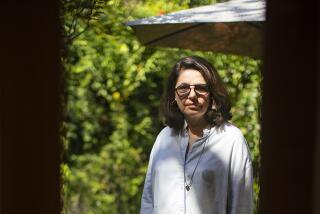Christa Wolf dies at 82; celebrated German writer
- Share via
Christa Wolf, one of Germany’s most celebrated writers for her depictions of life in the former communist East, but who was later damaged by revelations she collaborated with its secret police, has died. She was 82.
Wolf died Thursday in Berlin, according to an announcement from her publisher, Suhrkamp Verlag, which gave no cause of death or further information.
A committed Marxist in her early years, Wolf focused on life in the socialist state, exploring its ideals and the role of the individual in her novels such as “Divided Heaven” (1963), “Cassandra” (1983) and “The Quest for Christa T” (1968).
She became increasingly critical of East Germany and in 1989 joined the chorus of calls for reform that eventually led to the fall of the Berlin Wall. Wolf had hoped, however, that there could still be an independent future for the state in following a more humane form of socialism.
After German reunification, Wolf was criticized for not having been more critical of East Germany’s repression and for leaving the Communist Socialist Unity Party only in 1989.
Details also came to light that she had passed information to the Stasi secret police between 1959 and 1962, which damaged her reputation as she had earlier written about being under surveillance herself.
“Wolf was an enormously significant figure, regarded up until 1990 as someone who carefully and delicately expanded the boundaries of what could be said in East Germany,” Georgina Paul, an expert in East German literature at Oxford University, told Reuters.
“Her work is associated with the aesthetic of self-reflection…but could also have quite a lyrical force,” Paul added.
Born in 1929 in a part of Germany that is now in Poland, Wolf moved to East Germany in 1945 and joined the Socialist Unity Party in 1949. She studied German literature in Jena and Leipzig, and became a publisher and editor.
She won awards in both East and West Germany for her work, including the Thomas Mann Prize in 2010. The jury praised her life’s work for “critically questioning the hopes and errors of her time, and portraying them with deep moral seriousness and narrative power.”
Her 2010 book, “City of Angels or The Overcoat of Dr. Freud,” was a semi-autobiographical account of a visit to Los Angeles that Wolf made in the early 1990s as a scholar in residence at the Getty Center.
The novel recounts how the narrator deals with the discovery of her Stasi file, first inspected a few months earlier, and the media storm that it unleashed.
More to Read
Start your day right
Sign up for Essential California for the L.A. Times biggest news, features and recommendations in your inbox six days a week.
You may occasionally receive promotional content from the Los Angeles Times.



















































